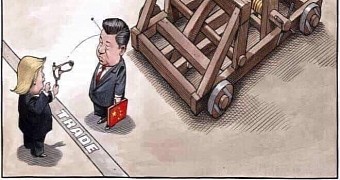The United States government just raised the tariffs on goods from China to 15% and 30% respectively, and Apple is one of the biggest companies affected.
The China-US trade war rages on, and it’s clear that there is one losing side, at least for now, and that’s the American people. Donald Trump announced a few days ago, via Twitter, that $300 million worth of goods and products from China are going to face an increased tariff, from 10% to 15%, starting with September 1st.
One of the companies hit by the new tariffs is Apple, whose products are made in China, with very few exceptions. The company now has a very tough choice to make, and that is pass on the cost of the tariff to the consumer or absorb it, at least for a little while.
Tariffs are no complicated
The one thing that’s clear right now is that on the short term, the people in the United States (meaning the consumers) usually absorb these tariffs. They are not paid by the Chinese people. On the longer term, Trump’s administration hopes that American companies will move their production out of China, but that could take many years.
A Reuters report confirmed that “the US Customs and Border Protection will also start collecting a 15% tariff on December 15 on the remainder of the $300 billion the, including cellphones, laptop computers, toys, and clothing, USTR said in the Federal Register filing.”
Furthermore, China-US second round of tariffs, at 30%, were aimed at different products, and once more, Apple is affected. Products such as Apple Watch, desktop Macs, Airpods, and HomePod are going to cost more.
The smaller 15% tariff, increase from 10%, is hitting iPhones, iPads, all MacBooks, Apple TV, and all other products made by the company. For now, Apple has yet to pass the increased costs to its consumers, but that could change at any minute. Just the tweets from Donald Trump manage to bring down the Apple shares by 4 points.
And all these developments happen despite the promise that tariffs won’t be increased because it might affect the Christmas shopping season.

 14 DAY TRIAL //
14 DAY TRIAL //